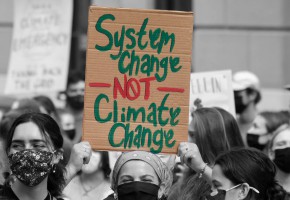
A Greenwashed Transition: The Illusion of Climate Solutions – Ouafa Haddioui

A Greenwashed Transition: The Illusion of Climate Solutions – Ouafa Haddioui
As the 29th Conference of Parties (COP29) looms, the illusion of progress pushed in global energy discourses is harder to ignore. The solutions celebrated at COP28—such as green hydrogen and climate finance—are less about addressing climate change and more about preserving global power imbalances. This dynamic aligns with what Tariq Ali calls the “extreme center,” a consensus among political and corporate elites that promotes technocratic fixes to maintain the status quo, while giving the appearance of bold action.
Green Hydrogen, a techno-optimistic bet
Green hydrogen has become the poster child of Europe’s climate agenda. It’s hailed as a revolutionary step toward decarbonization, with the EU targeting North African countries like Morocco and Tunisia as key partners. However, behind the polished narrative lies a familiar story of exploitation. Producing green hydrogen requires significant water resources, which are already in short supply in the region. Furthermore, the land footprint for this technology is substantial, affecting communities whose livelihoods, histories, and identities are tied to their land.
Morocco signed the first green hydrogen partnership with the EU ahead of COP27 in 2022, held in Egypt, laying the groundwork for the green hydrogen boom. Plans are set to install 6 gigawatts of renewable energy by 2030 to produce green hydrogen and its derivatives, such as green ammonia. The country plans to export over 70% of it to Europe and is allocating one million hectares of land for green hydrogen production. In addition to land, investors will benefit from a high incentive package, including exemptions from value-added taxes and duties, to provide with more confidence to buy into the scheme.
Instead of fostering a just energy transition, this represents a new form of extractivism. While Europe reduces its carbon emissions and secures cleaner energy, North Africa will bear the costs—water depletion, land dispossession, and the undermining of local livelihoods. This isn’t a progressive energy transition but a continuation of colonial logic, where resource extraction is repackaged in a green narrative. As in the past, the Global North’s interests take precedence, leaving behind environmental degradation and social injustice in the Global South.
Climate Reparations or Debt Trap?
Climate finance, another major issue from COP28 and likely to remain contentious at COP29, has been framed as a solution. Wealthy nations have promised $100 billion annually to support the Global South’s adaptation and mitigation efforts. However, since this pledge in 2009, most of the funds remain undelivered. What little has been provided often arrives in the form of loans, not grants, creating yet another mechanism of financial dependency over the countries least responsible for the climate crisis but most affected by it.
Institutions like the World Bank present these loans as benevolent aid, but they are tools of control. Countries already burdened by colonial legacies and systemic inequality are being forced to take on more debt under the pretense of climate action. The Loss and Damage Fund, introduced at COP28 to help countries rebuild after climate disasters, was supposed to offer relief. However, with only $700 million pledged against the $580 billion needed annually, the fund is little more than an empty promise.
True climate reparations must go beyond loans and weak funding commitments. They should take the form of unconditional grants, recognizing the Global North’s historical responsibility for centuries of exploitation and ecological destruction. Climate reparations are not about charity but accountability—acknowledging the ecological devastation caused by industrialized nations and repaying the climate debt owed to the Global South.
Allure of Technofixes: A Convenient Illusion
Technological fixes like green hydrogen are especially appealing to the extreme center. As Tariq Ali describes, this political consensus presents itself as progressive while perpetuating the same structures of corporate and state control. Technofixes allow the Global North to maintain its consumption patterns and economic growth while creating the illusion of meaningful climate action. The true costs—environmental degradation and social injustice—are offloaded onto the Global South.
Green hydrogen fits perfectly into this framework. Europe can decarbonize its economy, maintain industrial growth, and appear to be leading the fight against climate change, all while outsourcing the environmental and social costs to North Africa. Vandana Shiva reminds us that climate change is not merely a technical issue—it is rooted in centuries of extractivism, exploitation, and inequality. Technological solutions like green hydrogen do little to address these underlying injustices. In fact, they often exacerbate the very inequalities they claim to solve. Technofixes are politically convenient, masking the inaction of global elites behind the façade of technological innovation. These fixes fail to dismantle the power structures responsible for the climate crisis.
Reclaiming the Narrative
As COP29 approaches, the world faces a stark choice: continue down the path of greenwashing and technofixes, or demand real, transformative change. A true energy transition must be decolonial and just, centering the voices of those most affected by the crisis. This means rejecting corporate-driven, market-based solutions like green hydrogen that deepen existing inequalities, and embracing community-led, sustainable alternatives.
The Global North must take responsibility for its role in causing the climate crisis by providing genuine climate reparations—not loans, but grants. These reparations should go beyond financial compensation to include the dismantling of the structures that continue to exploit the Global South for the benefit of the wealthy few.
At COP29, the extreme center will likely continue pushing false solutions cloaked in the language of progress and sustainability. But these solutions serve only to maintain the power dynamics that led to the climate crisis in the first place. As Malcolm Ferdinand reminds us, the transition we need cannot be one where a few are saved while the rest are sacrificed. We need a radical restructuring of global energy politics—one that ensures all peoples can navigate the transition with their rights, dignity, and livelihoods intact. The clock is ticking. Will COP29 be another exercise in greenwashing and false promises, or will it mark the beginning of a truly just and sustainable future for all?
Ouafa Haddioui
Recent publications

ANND Newsletter January 2026 - From Davos to the UPR: Between Promises, and Accountability
Related publications

An Alternative progressive cycle and a revitalized multilateral system - Roberto Bissio

